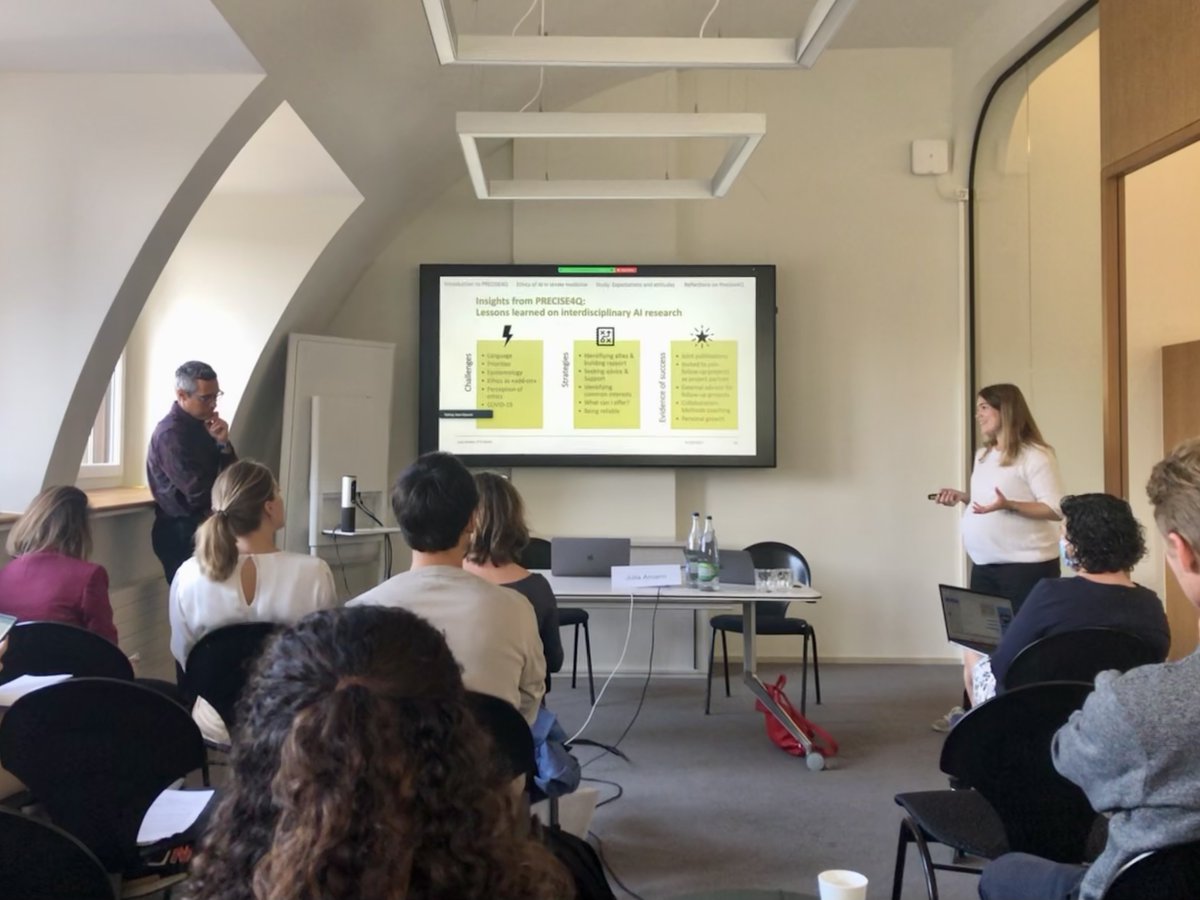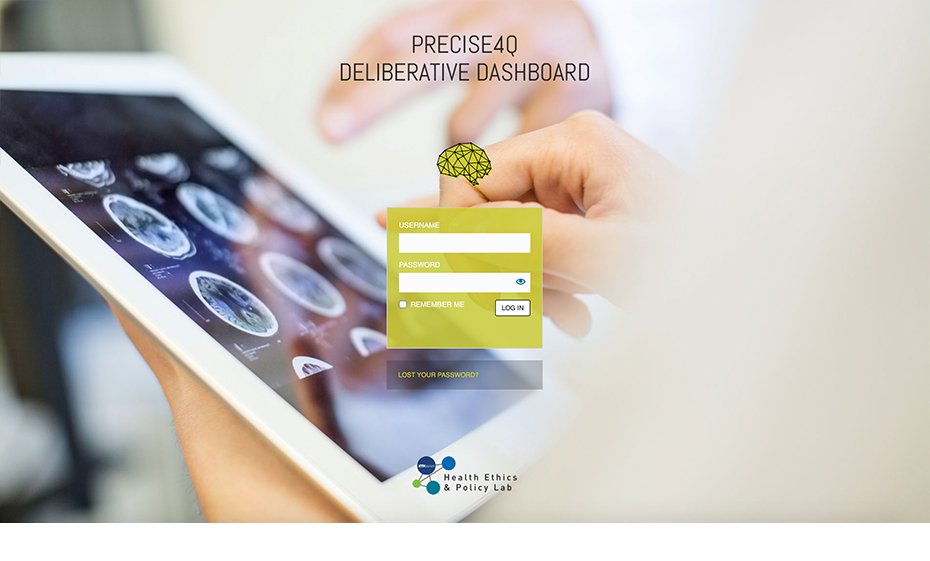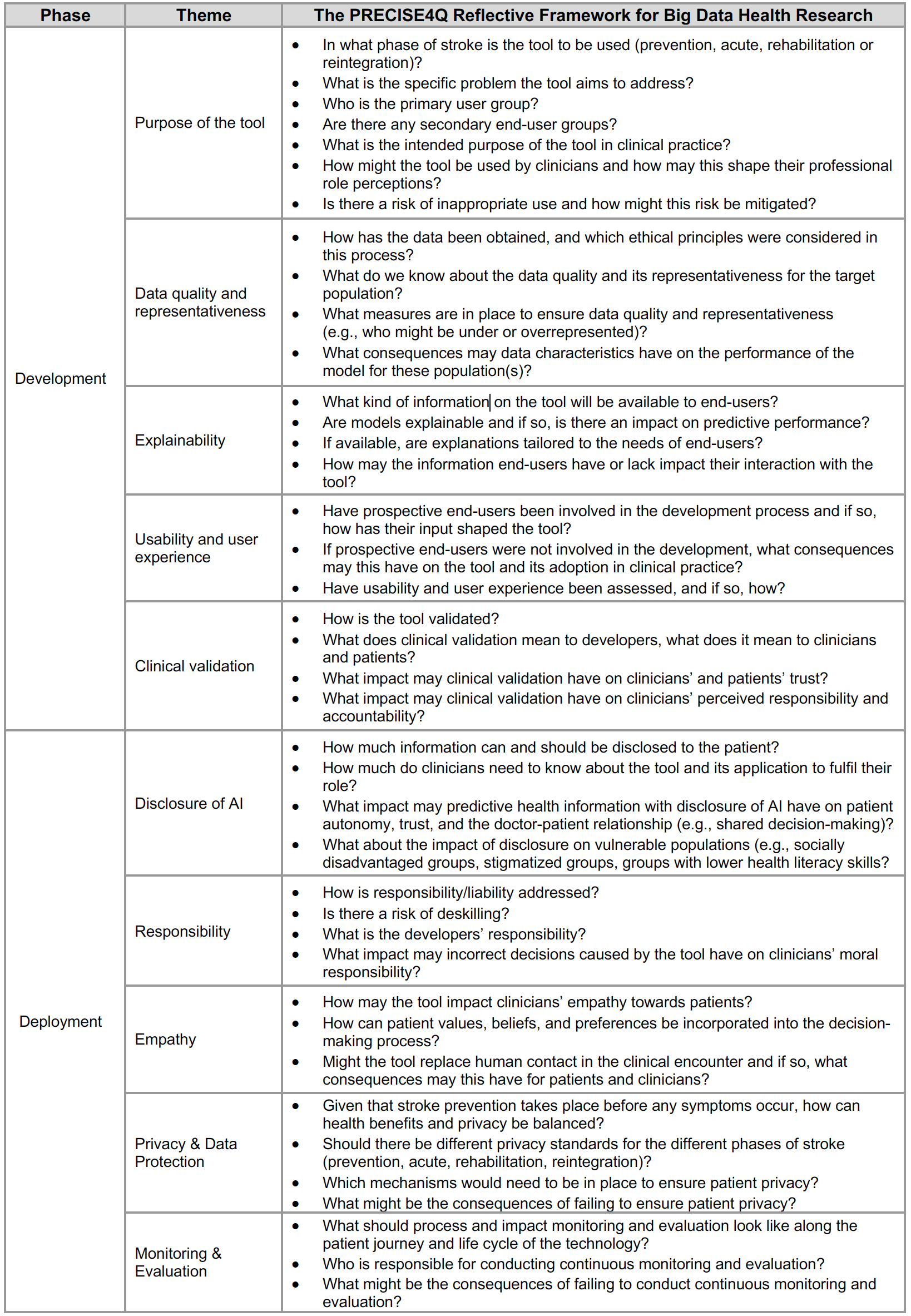Precise4Q: AI in stroke medicine
PRECISE4Q sets out to minimize the burden of stroke for the individual and for society.
Stroke is one of the most severe medical problems with far-reaching public health and socio-economic impact, gathering momentum in an ageing society. Over the course of four years, PRECISE4Q sets out to minimise the burden of stroke for the individual and for society. To this end, the consortium is developing multi-dimensional data-driven predictive models which enable – for the first time – personalised stroke treatment that addresses the patient’s needs in four stages: prevention, acute treatment, rehabilitation, and reintegration.
As part of an international consortium, the Health Ethics and Policy Lab is exploring the opportunities and challenges related to the introduction of these new technologies into clinical practice. In our research, we investigate different stakeholders' expectations and attitudes towards the use of artificial intelligence in clinical care for stroke patients. Stakeholders in this context include healthcare professionals, patients, and informal caregivers. We are scoping the future of AI in this particular domain of medicine.
The PRECISE4Q consortium unites researchers from a variety of different disciplines and backgrounds. This interdisciplinary approach presents an excellent opportunity for mutual learning and the generation of novel insights when it comes to the ethical questions that predictive modeling for stroke raises. Yet for this interdisciplinary collaboration to achieve its full potential, a common language and understanding of relevant ethical concepts are needed.

Project Link: external page precise4q.eu
Project Partner: external page Horizon2020
Project Team:
Sara Kijewski
Julia Amann
Alessandro Blasimme
Effy Vayena
Peer-reviewed publications
Allahabadi, H., Amann, J., Balot, I., Beretta, A., Binkley, C., Bozenhard, J., ... & Zicari, R. V. (2022). Assessing Trustworthy AI in times of COVID-19. Deep Learning for predicting a multi-regional score conveying the degree of lung compromise in COVID-19 patients. IEEE Transactions on Technology and Society.
Sleigh, J., & Amann, J. (2022). Fostering ethical reflection on health data research through co-design: A pilot study. International Journal of Ethics Education, 7(2), 325-342.
Amann, J., Vetter, D., Blomberg, S. N., Christensen, H. C., Coffee, M., Gerke, S., ... & Z-Inspection initiative. (2022). To explain or not to explain?—Artificial intelligence explainability in clinical decision support systems. PLOS Digital Health, 1(2), e0000016.
Zicari, R. V., Amann, J., Bruneault, F., Coffee, M., Düdder, B., Hickman, E., ... & Wurth, R. (2022). How to Assess Trustworthy AI in Practice. arXiv preprint arXiv:2206.09887.
Herrgårdh, T., Hunter, E., Tunedal, K., Örman, H., Amann, J., Navarro, F. A., ... & Cedersund, G. (2022). Digital twins and hybrid modelling for simulation of physiological variables and stroke risk. bioRxiv.
Zicari, R. V., Ahmed, S., Amann, J., Braun, S. A., Brodersen, J., Bruneault, F., ... & Wurth, R. (2021). Co-design of a trustworthy AI system in healthcare: deep learning based skin lesion classifier. Frontiers in Human Dynamics, 3, 688152.
Amann, J. (2021). Machine Learning in Stroke Medicine: Opportunities and Challenges for Risk Prediction and Prevention. Artificial Intelligence in Brain and Mental Health: Philosophical, Ethical & Policy Issues, 57-71.
Zicari, R. V., Brusseau, J., Blomberg, S. N., Christensen, H. C., Coffee, M., Ganapini, M. B., … Amann, J. ... & Kararigas, G. (2021). On assessing trustworthy AI in healthcare. Machine learning as a supportive tool to recognize cardiac arrest in emergency calls. Frontiers in Human Dynamics, 30.
Updating precision: Ethical and societal aspects of precision medicine in the era of big data
In this workshop we explored how the notion of precision is evolving at the intersection of personalized medicine and big data. In particular, far from taking the promise of precision in medicine as a byproduct of technological development, we set out to discuss the assumptions about human health and disease that sustain the quest for precision in the first place. We thus interrogated how such transformations invest research participants, scientists, patients, physicians, healthcare institutions and policy makers.
Links to the presentations
- Download vertical_align_bottom Dr. Julia Amann, 2022. Expectations and attitudes towards medical artificial intelligence (PDF, 899 KB)
- Download vertical_align_bottom Dr. Luca Chiapperino, 2022. Udating Precision: Ethical and Societal Aspects of Precision Medicine in the Era of Big Data RE-IMAGINING ‘PRECISION’ The case of cancer immunotherapies (PDF, 1.9 MB)
- Download vertical_align_bottom Prof. Barbara Prainsack, 2022. The value*s of Precision Medicine (PDF, 3.3 MB)
- Download vertical_align_bottom Kelly Ormond, MS, CGC, 2022. Public preferences towards data management and governance in biobanks: A focus on the Swiss views (PDF, 7.2 MB)

Deliberative dashboard
To cultivate such a common language and understanding we set up the Precise4Q Deliberative Dashboard. The Deliberative Dashboard is designed as an interactive platform to facilitate the discussion of ethical issues that arise within the project. In addition, the Deliberative Dashboard also provides consortium partners with a curated list of relevant ethics resources, which are continuously reviewed and updated throughout the course of the project.

We developed the PRECISE4Q Reflective Framework for Big Data Health Research to guide the development of these technologies and their translation into the clinical context beyond the termination of the project. The reflective framework can be applied to identify pertinent ethical issues and take appropriate measures during both the development and deployment of AI-technologies in health. It is rooted in normative considerations, building on existing ethical frameworks, and considers the lived experience, attitudes, values, and expectations of prospective users, beneficiaries, and developers. It has undergone two rounds of revisions based on the consortium partners’ feedback and a public symposium to ensure its utility, usability, and overall fit for purpose.
